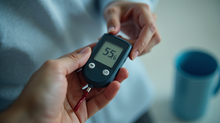Guest blog-Can Diabetes Type 2 Be Reversed? Experts Answer (Part 3 of 4)
- Jasmine Burns
- Sep 14, 2017
- 6 min read

(Due to the length of this article it is being presented in 4 parts-Maureen)
It is the burning question most, if not all, people with diabetes type 2 have: can my diabetes be reversed?
There is so much information, thousands of articles, home remedies that promise readers the ultimate chance to reverse their diabetes. It sounds too good to be true.
However, as with all things on the net and with our health, we must be wary of what we read and what is fed to us as information. Most articles recommend healthy eating and exercising as a way of reversing your diabetes.
These are two lifestyle changes that are easy to do if you put your mind into it. Does it work though? If it does, how can you go about doing this or where should you start? We reached out to 28 experts in the field who spilled the beans to us about the reversal of diabetes type 2 and whether it is a myth or a reality. To find out more, please keep reading.
15. Karen Fisher, MS, RD, LDN, CDE
As a registered dietitian nutritionist and certified diabetes educator, I am frequently asked that question. In the 30 years I’ve been practicing, I have witnessed normalization of glucose levels in many individuals diagnosed with type 2 diabetes, occuring when lifestyle changes of improved eating habits and regular exercise are made.
The success in bringing down A1c and glucose levels is usually attributed to weight loss, but I see it occur without weight loss as well.
When we move our bodies on a daily basis as nature intended, and eat minimally processed foods, we give our bodies the ability to function efficiently, including using the fuels from our food without an accumulation of excess glucose in the bloodstream.
Many individuals diagnosed with diabetes are under the misconception that major changes in their eating and excercise need to occur for there to be a success in managing the condition.
This contributes to the fact that as many as 90% of those with diabetes never receive any education on how to be an active participant in the control of their numbers.
The beauty of diabetes education is that nutrition and diabetes experts can give simple yet effective suggestions for small changes that can have a big impact in managing glucose.
Basic changes like adding protein to a sweet and reducing the portion and frequency of consumption work much better for those with diabetes and a sweet tooth than the notion that they should never eat sweets again, only to feel guilty when inevitably doing so.
Whether the diabetes is reversed, or the glucose levels are being managed within a normal range, is a topic of debate and may largely be a matter of semantics. Complications of diabetes don’t automatically come with the diagnosis, they occur with chronic high glucose levels.
Working with their primary care provider, specialists and diabetes educators, those with diabetes can control their numbers, and whether we call their diabetes ‘reversed’ or perhaps more correctly, ‘managed’, the closer to normal glucose levels, the better health people with diabetes will have.
16. Beth Silvers RD CDE LDN MS CPT PWD
Yes and no. If you learn to live a healthier lifestyle and stay with it for your remaining years, then yes it can be reversed. This assumes you realized your diagnosis early and you are able to get your A1c below 6%. If you realized your diabetes too late or your A1c is not coming down without insulin then probably not. This is easier to reverse when you are overweight or obese but not so if your BMI is below 25.
This healthy lifestyle we refer to is being active 150 minutes or more each week and eating a meal plan low in fat and processed sugar with 3-5 vegetables and 2-3 fruits a day most days. It does not require low or no carbohydrate diet like Atkins or counting carbohydrates every meal. Most folks do better when they spread the carbohydrates out evenly over the day.
Be healthy
Eat smart
Move more
And live well whether you reverse your diabetes or just keep it in your side car.
17. Heather Comartin BScN RN CDE
No, type 2 diabetes is not reversible, but it can be controlled and that is what everyone should aim for. An A1C of 6.4 or even a 5.5 shows control and is something to be very proud of. It may mean you can come off your medication, or stop checking 4 times a day, but you still have diabetes.
Your diabetes is in control and you still need to monitor it daily or once a week. A perfect example is a patient who thru weight loss, and following his meal plan was able to get his A1C down below 6.5. His doctor was very happy and took him off his medications and told him he didn’t need to check his sugar.
About a year later, he came to our classes after losing part of his foot and was severely depressed. He was depressed because he put his meter and his diabetes up on the shelf in the closet and forgot about it, he thought he had reversed it.
18. Nancy L. Schwartz, RD, LMNT, CDE
I do not believe it can be an actual reversal, more of a remission. If no longer needing medication to control blood sugar looks like reversal it is only possible if the person maintains regular exercise and a healthy weight. The length of time one has diabetes plays a role as does one’s genes. There are some thin people who have type 2 diabetes due to heredity.
Weight and lifestyle are things that can be changed, and they are important parts of overall health. If one can manage on lifestyle alone that’s great, but if medication is necessary, the person should take advantage of the treatment that’s going to keep blood sugar, blood pressure and cholesterol in check. They are ALL important.
19. Fryn Schafer RDN, CD, CDE, LCDE-IN
Well, that depends on the definition of ‘reversed’. If it means the disease goes away, then no it is not reversed. If is means the need to use medication to control blood sugar is reduced or eliminated, then yes. The explanation is found in the basic pathophysiology of DMT2, the hallmark of which is insulin resistance.
This creates an internal environment that requires the pancreatic bata cells to work very hard to produce enough insulin to feed those ‘resistant’ cells. Beta cells can produce enough inulin for a while but once blood sugar levels are rising above normal, a good percentage of those cells have worked themselves to death.
They cannot be revived. If, before that happens, insulin resistance is reduced, remaining beta cells can continue health and viable for sometime, although T2, to date, tends to be progressive.
Lifestyle changes resulting in weight management and increased well being are very effective in the treatment of early DMT2 because the pressure on the beta cells becomes more manageable. If changes are not made before beta cell demise, then medication is likely necessary for life.
20. Chandra Bivens Carty
Can DM2 be cured?
Bariatric surgery leads to improvement and even curing DM2 but the mechanisms are different. Meijer R “Bariatric surgery as a novel treatment for type 2 diabetes mellitus ArchSurg.2011 Jun;146(6):744-50
The reasons the surgical gastric banding or the adjustable silicone sleeve improves diabetes control is because it decreases food intake and body weight with a slowing of gastric emptying.
The Roux-en-Y gastric bypass and biliary-pancreatic diversion, not only restricts the food but it causes malabsorption , as well as this procedure bypass the foregut resulting in increase weight loss and elevation of enteroglucagon level.
Other studies suggest that metabolic surgeries improve glycemic control. There is improved insulin resistance the mechanism is not quite clear. There maybe enhanced postprandial GLP-1 response and remission of type 2 diabetes. Dimitrios J., Annals of Surgery. 2010;252(6):966-971
21. Maureen Sullivan-Tevault, RN, MS, BSN, CEN, CDE
When it comes to type 2 diabetes, a lot of discussion has been around a single question: Can type 2 diabetes be reversed? In order to fully understand the question, one must first define the word, “reverse”.
“Reverse” has several meanings. As a verb, it means to move backward; as an adjective, it means going in the direction opposite to that previously stated; as a noun, it means a complete change of direction or action. One word, several meanings….much like the word diabetes itself.
Diabetes is confirmed by laboratory (blood) levels:
A fasting blood glucose level of 126mg/dl (on two separate occasions)
An A1C level greater than 6.5%
Most persons diagnosed with type 2 diabetes have some areas in their life that could benefit from diet and exercise, as well as lifestyle changes:
Improvement in diet (fresh fruits, vegetables, whole grains, lean meats)
Weight loss (5-7% weight loss)
Increased activity (aim towards goal of 150minutes/week)
Stress reduction
Smoking cessation(including E-cigs, cigars, chewing tobacco)
Successfully addressing diet and activity issues often results in reducing blood glucose levels. Often times, medication dosages can be reduced, even discontinued. A type 2 diabetic can be “diet controlled” in some instances; thus, “reversing” the need for medication at this time.
To clarify a “best case scenario”, the blood glucose level has been lowered; the need for medication has been reversed/stopped; the (diabetic) condition is now diet controlled.
On a personal note, I always encourage full disclosure of a history of diabetes, even if currently diet controlled. Although a glucose level may now be within normal range, certain medical treatments/medications/illnesses may trigger a hyperglycemic (high blood glucose) level. The fully informed medical provider will closely monitor these patients and prevent uncontrolled glucose spikes from occurring.



































Comments